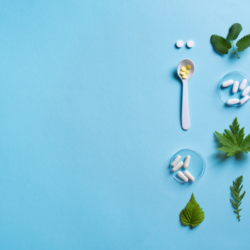The immune system helps maintain the integrity of the organism by excluding foreign constituents. Immunity is the ability of an organism to defend itself against any aggression from the external environment (bacteria, virus, fungus, antigen). In autumn and winter, immunity weakens leaving the field free for any type of virus spreading like wildfire, thus becoming a major public health issue.
This is why Soin et Nature has selected the immunity herbal tea for you to boost your immune system to have a peaceful season.
Composition and properties of herbal tea to boost immunity
Peppermint, for its immune and anti-infectious properties:
Peppermint is antiviral like other plants in the mint family. Mint leaves have indeed shown antiviral activity against respiratory syncytial virus (RSV) with a high selectivity index, and decreased the production of nitric oxide (= nitric oxide = NO), TNF-α, d ‘IL-6 and PGE2, translating a significant anti-inflammatory action . An antioxidant activity was also noted.
Peppermint especially seems to act as a nasal decongestant . In reality, this effect would rather correspond to a feeling of freshness, caused by the interaction of menthol with the trigeminal nerve and the cold receptors in the nasal cavities and pharynx.
Thyme, for its immunomodulating properties:
While reducing the proliferation of T lymphocytes, thyme vulgaris has the ability to activate dendritic cells, which play the role of antigen presenters in the immune system .
The vulgaris T. inhibits further proliferation of lymphocytes stimulated by mitogen, in connection with the thymol and activity cytotoxic .
Echinacea, for its immunostimulating and immunomodulating properties:
-
Immunostimulating action:
Echinacea modulates and strengthens the body’s immune defenses against infectious agents. This widely documented action is attributed to the lipophilic ethanolic fraction (in particular the alkylamides) and the hydrophilic polysaccharide fraction. The phenolic derivatives of caffeic acid (especially cichoric acid) also seem to play an important role in this action.
In particular, echinacea exerts beneficial effects on strain stress-induced immunosuppression in vivo by increasing splenocyte proliferation and killer cell (NK) activity, while modulating T lymphocyte subsets and levels of cytokines in the blood.
-
Non-specific (innate) immunostimulation:
Echinacea also stimulates the activity of macrophages through arabinogalactan with activation of their cytotoxic and phagocytic power (serum and tissue). It also activates the production of α and β interferons, IL-1, IL-10 and TNF-α (arabinogalactin). Alkylamides nevertheless modulate the gene expression of TNF-α by acting on type 2 cannabinoid receptors.
This plant stimulates the activation of classical and alternate complement8 pathways, thus activating nuclear factor kappa B (NF-kB), and stimulates the non-specific immune response in vivo .
-
Specific (acquired) immunomodulation:
Echinacea increases the number of white blood cells and in particular lymphocytes. Echinacea polysaccharides exert in vitro a dose-dependent adjuvant effect on the cytokine response of T cells. It thus stimulates the formation of cytokines (interleukins IL-1β and IL-6) in a dose-dependent manner in various cell cultures: echinacea increases the production by leukocytes of the cytokines Th1 ‘interleukins IL-1β, IL-6, IL-8) and Th2 (interleukin IL-4).
This plant also increases the activation of natural killer NK cells and increases the synthesis of immunoglobulins (IgA, IgG and IgM), while decreasing the formation of immune complexes.
In summary, Echinacea reduces the number and function of regulatory T lymphocytes in association with the strengthening of antigen presenting cells (APC), which contributes to the improvement of immune function .
Elderberry, for its immunostimulatory properties:
-
At the respiratory level:
In humans, a study in 12 healthy donors showed that elderberry activates healthy immunity by significantly increasing the production of inflammatory cytokines (IL-1β, TNF-α, IL-6, IL-8) by compared to lipopolysaccharide (LPS), a known activator of monocytes. The most marked increase was observed in the production of tumor necrosis factor alpha (TNF-α). These immunostimulatory properties could be of interest in subjects with influenza, as well as immunocompromised patients.
Medical bibliographic sources and clinical trials :
- Hermann E.C Jr et al., Antiviral Substances in Plants of the Mint Family (Labiatae). III. Perpermint (Mentha piperita) and other Mint Plants, Proc Soc Exp Biol Med (Maywood), 1967
- Eccles R. et al., The effects of oral administration of (-)-menthol on nasal resistance to airflow and nasal sensation of airflow in subjects suffering from nasal congestion associated with the common cold, The journal of Pharmacy and Pharmacology, 1990
- Amir ghofran Z. et al. In vitro immunomodulatory effects of extracts from three plants of the Labiatae family and isolation of the active compound(s); J Immunotoxicol., 2011
- Zhai Z. et al., Enhancement of innate and adaptive immune functions by multiple Echinacea species, J Med Food., 2007
- Kapai N.A. et al., Selective cytokine-inducing effects of low dose Echinacea, Bull Exp Biol Med., 2001
- Yamada K. et al., A comparison of the immunostimulatory effects of the medicinal herbs Echinacea, Ashwagandha and Brahmi; J Ethnopharmacol., 2011
- Sullivan A.M. et al., Echinacea induced macrophage activation, Immunopharmacol Immunotoxicol., 2008
- Luettig B. et al., Macrophage activation by the polysaccharide arabinogalactan isolated from plant cell cultures of Echinacea purpurea, J Natl Cancer Inst., 1989
- Gertsch J., Schoop R., Kuenzle U. et al., Echinacea alkylamides modulate TNF-alpha gene expression via cannabinoid receptor CB2 and multiple signal tranduction pathways, 2004
- Kim H.R. et al., Immune enhancing effects of Echinacea purpurea root extract by reducing regulatory T cell number and function; Nat Prod Commun., 2014
- Fonseca E.N. et al., Echinacea purpurea (L.) Moench modulates human T-cell cytokine response, Int Immunopharmacol., 2014
- Catanzaro M. et al., Immunomodulators Inspired by Nature; A Review on Curcumin and Echinacea, Molecules, 2018
- Barak V. et al., The effect of Sambucol, a black elderberry-based, natural product, on the production of human cytokines; I. Inflammatory cytonkines, Eur Cytokine Netw., 2001
- Barak V. et al., The effect of herbal remedies on the production of human inflammatory and anti-inflammatory cytokines; Isr Med Assoc J., 2002






I love drinking herbal tea